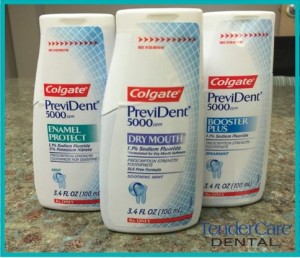Have you ever been to the dentist and wondered why he or she said that you should use prescription toothpaste? Let me give you a few reasons why a dentist might have you use prescription toothpaste. First, what is prescription toothpaste and how does it differ from regular toothpaste. Prescription toothpaste like the name implies is toothpaste that requires a prescription or purchase from a dentist. You will not find these toothpastes in your local grocery store. The reason that a prescription is required is due to the high amounts of fluoride in the toothpaste and in the wrong hands that can be dangerous like children.
There are many brands and types of prescription toothpaste for example PreviDent, Fluoridex, Clinpro 5000 and GC MI Paste just to name a few. Generally the chemical make components of each toothpaste are the same with GC MI Paste as the exception. The key ingredient for all of these brands of prescription toothpaste is 1.1% Sodium Fluoride which is safe and extraordinarily effective at caries prevention when applied frequently to teeth. Other types of prescription toothpastes might contain 5% Potassium Nitrate which helps with sensitive teeth or some might be Sodium Lauryl Sulfate Free and formulated specifically for people with dry mouth. So because of the high content of fluoride in these toothpastes a prescription is required from a doctor or dentist.

Each patient situation is different hence the variety of prescription toothpastes, so a dentist or doctor needs to do a thorough examination and diagnose the patient symptoms. The most common use for prescription toothpaste is a patient that is highly susceptible to caries or cavities. Patients that have a lot of cavities initially, patients that repeatedly have multiple cavities, patients with many dental restorations, patients with sensitive teeth or patients that have poor oral hygiene are all good candidates for prescription toothpaste. There are other reasons that a dentist might prescribe prescription toothpaste, but these seem to be the most common. Then depending on what symptoms that patient have a dentist will decide which prescription toothpaste would be the most effective.
Prescription toothpastes should be used frequently and regularly to be the most effective. Following the manufactures and dentist instructions will make the prescription toothpaste the most successful. There are a few ways that prescription toothpaste can be used. The most common is as the patient’s regular toothpaste to be applied twice a day when brushing teeth. The difference will be to not rinse mouth with water after brushing, but spitting out the excess. It is important NOT to swallow the toothpaste. It is not to be used systemically. Another way a dentist might recommend using prescription toothpaste is in trays. A dentist will make trays that will be custom fit to the patient’s teeth. The prescription toothpaste is applied directly into the trays and can be worn for a few hours or even over night. These are the two most common ways to use prescription toothpaste.
It is very important that prescription toothpastes not be used by children under the age of 6 years unless recommended by a dentist or physician. Prolonged ingestion of the prescription toothpaste can result in fluorosis especially in the water in the area contains more than 0.6 ppm of fluoride. Any children under the age of 12 should be supervised when using prescription toothpaste, so they do not swallow excessive amounts of the toothpaste.
If you have more questions or concerns about prescription toothpastes talk with your dentist or physician. If you would like to see us here at Tigard TenderCare Dental give us a call at 503-670-7088.

Leave a Reply